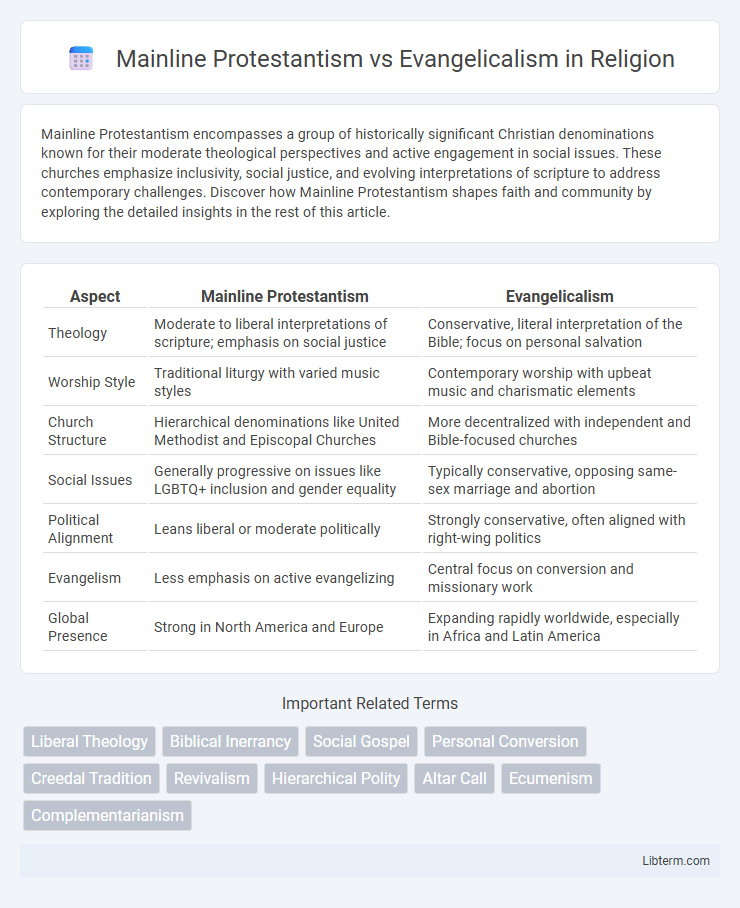Mainline Protestantism encompasses a group of historically significant Christian denominations known for their moderate theological perspectives and active engagement in social issues. These churches emphasize inclusivity, social justice, and evolving interpretations of scripture to address contemporary challenges. Discover how Mainline Protestantism shapes faith and community by exploring the detailed insights in the rest of this article.
Table of Comparison
| Aspect | Mainline Protestantism | Evangelicalism |
|---|---|---|
| Theology | Moderate to liberal interpretations of scripture; emphasis on social justice | Conservative, literal interpretation of the Bible; focus on personal salvation |
| Worship Style | Traditional liturgy with varied music styles | Contemporary worship with upbeat music and charismatic elements |
| Church Structure | Hierarchical denominations like United Methodist and Episcopal Churches | More decentralized with independent and Bible-focused churches |
| Social Issues | Generally progressive on issues like LGBTQ+ inclusion and gender equality | Typically conservative, opposing same-sex marriage and abortion |
| Political Alignment | Leans liberal or moderate politically | Strongly conservative, often aligned with right-wing politics |
| Evangelism | Less emphasis on active evangelizing | Central focus on conversion and missionary work |
| Global Presence | Strong in North America and Europe | Expanding rapidly worldwide, especially in Africa and Latin America |
Historical Origins of Mainline Protestantism and Evangelicalism
Mainline Protestantism traces its roots to the early Protestant Reformation in the 16th century, emphasizing established churches such as Lutheran, Methodist, Presbyterian, and Episcopalian denominations that prioritize tradition, liturgy, and social justice. Evangelicalism emerged later in the 18th century during the Great Awakening revivals in America, characterized by a focus on personal conversion, biblical authority, and evangelism. Both movements shaped American religious history but differ significantly in theology, worship style, and cultural engagement.
Core Doctrinal Beliefs Compared
Mainline Protestantism and Evangelicalism differ significantly in core doctrinal beliefs, particularly regarding biblical authority, salvation, and social engagement. Mainline Protestants often embrace a more flexible interpretation of scripture, emphasizing social justice and inclusivity, while Evangelicals affirm the inerrancy of the Bible and prioritize personal conversion and salvation through faith in Jesus Christ. These distinctions shape varied worship styles, theological emphases, and cultural influences within each tradition.
Worship Styles and Practices
Mainline Protestantism typically features structured liturgies with traditional hymns, formal prayers, and sacramental rituals emphasizing historical creeds and theological reflection. Evangelical worship emphasizes contemporary music, spontaneous prayer, and personal testimonies, fostering emotional engagement and individual conversion experiences. These differences reflect broader theological priorities, with Mainline traditions valuing institutional heritage and Evangelicals prioritizing personal faith expression.
Attitudes Toward Scripture
Mainline Protestantism tends to interpret Scripture through historical-critical methods, emphasizing context and metaphorical meanings, which allows for a more flexible and evolving understanding of biblical texts. Evangelicalism holds a high view of biblical inerrancy and authority, promoting a literal interpretation of Scripture as the foundational guide for faith and practice. These differing attitudes toward Scripture influence worship styles, doctrinal emphasis, and social engagement within each tradition.
Social and Political Engagement
Mainline Protestant denominations typically advocate for progressive social policies, emphasizing social justice, inclusivity, and support for environmental causes, often influencing liberal political agendas in the United States. Evangelicalism, in contrast, tends to prioritize conservative social values, actively engaging in political issues such as opposition to abortion, promotion of traditional family structures, and religious freedom, aligning with right-leaning political movements. Both expressions of Protestantism significantly shape American religious political landscapes but diverge sharply on social policy priorities and methods of civic involvement.
Denominational Diversity and Structure
Mainline Protestantism encompasses a broad range of historically established denominations such as the United Methodist Church, the Evangelical Lutheran Church in America, and the Presbyterian Church (USA), featuring hierarchical and connectional structures that emphasize collective governance through councils and synods. Evangelicalism spans across diverse denominational lines including Baptist, Pentecostal, and non-denominational churches, characterized by congregationalist polity that prioritizes local church autonomy and emphasize personal conversion experiences. The structural differences reflect divergent theological priorities and governance models, with mainline denominations often institutionalized and evangelicals more decentralized yet rapidly growing through networked congregations and parachurch organizations.
Approaches to Theology and Tradition
Mainline Protestantism emphasizes historical-critical methods and embraces theological diversity, often supporting progressive interpretations of scripture and tradition. Evangelicalism prioritizes biblical inerrancy and personal conversion experiences, upholding a more conservative and literal approach to theology. While Mainline traditions integrate contemporary scholarship into creed and practice, Evangelicals hold closely to established confessions and prioritize evangelism rooted in Scripture.
Views on Social Issues and Inclusivity
Mainline Protestantism generally promotes social justice, inclusivity, and progressive stances on issues such as LGBTQ+ rights and gender equality, often supporting same-sex marriage and ordaining women. Evangelicalism tends to uphold more conservative views, emphasizing traditional family values, opposing same-sex marriage, and often resisting gender role changes within church leadership. These differing social perspectives significantly shape each group's cultural engagement and theological priorities.
Patterns of Membership and Demographic Trends
Mainline Protestantism experiences slower membership decline and aging demographics compared to Evangelicalism, which shows stronger growth among younger populations and ethnic minorities. Evangelical churches often emphasize evangelism and personal conversion, driving higher retention rates and expansion in urban and suburban areas. Studies reveal Mainline denominations face challenges in attracting youth, whereas Evangelical groups benefit from dynamic worship styles and community engagement boosting membership diversity.
Impact on American Religious Landscape
Mainline Protestantism shaped American religious culture by emphasizing social justice, ecumenism, and theological diversity, influencing education and civil rights movements. Evangelicalism, characterized by biblical inerrancy, personal conversion, and active evangelism, has driven political realignment and cultural conservatism, significantly impacting voter behavior and public policy. Together, these traditions highlight the dynamic spectrum of American Protestantism and its role in shaping national identity and social values.
Mainline Protestantism Infographic

 libterm.com
libterm.com